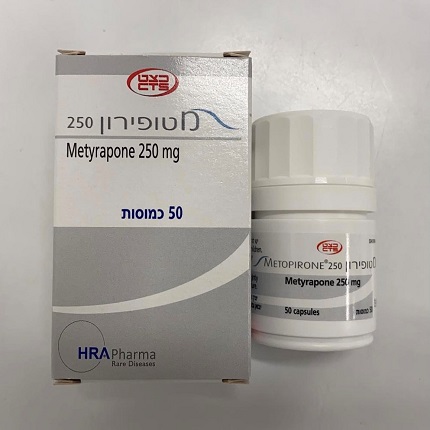Quest for the right Drug

מטופירון 250 METOPIRONE 250 (METYRAPONE)
תרופה במרשם
תרופה בסל
נרקוטיקה
ציטוטוקסיקה
צורת מתן:
פומי : PER OS
צורת מינון:
קפסולות : CAPSULES
עלון לרופא
מינוניםPosology התוויות
Indications תופעות לוואי
Adverse reactions התוויות נגד
Contraindications אינטראקציות
Interactions מינון יתר
Overdose הריון/הנקה
Pregnancy & Lactation אוכלוסיות מיוחדות
Special populations תכונות פרמקולוגיות
Pharmacological properties מידע רוקחי
Pharmaceutical particulars אזהרת שימוש
Special Warning עלון לרופא
Physicians Leaflet
Special Warning : אזהרת שימוש
4.4 Special warnings and precautions for use
Diagnostic applications
The metyrapone diagnostic test should be restricted to hospital.
Patients with reduced adrenal secretory capacity and serious hypopituitarism The ability of the adrenal cortex to respond to exogenous ACTH should be demonstrated before Metopirone is employed as a test, because Metopirone may induce acute adrenal insufficiency in patients with reduced adrenal secretory capacity as well as in patients with global pituitary insufficiency. The test should be performed in hospital with close monitoring in case of suspected adrenocortical insufficiency.
Reduced liver function
Patients with liver cirrhosis often show a delayed response to Metopirone due to liver damage delaying the plasma elimination half-life of cortisol.
Patients with hypothyroidism or taking drugs affecting the hypothalamo-pituitary adrenal axis In cases of thyroid hypofunction, urinary steroid levels may rise very slowly, or not at all, in response to Metopirone. Before the Metopirone test is carried out, drugs affecting pituitary or adrenocortical function should be discontinued (see section 4.5). If adrenocortical or anterior pituitary function is more severely compromised than indicated by the results of the test, Metopirone may trigger transient adrenocortical insufficiency. This can be rapidly corrected by giving appropriate doses of corticosteroids.
Therapeutic use
Hypocortisolism
The product should only be used under the supervision of specialists having available the appropriate facilities for monitoring of clinical and biochemical responses. Treatment with Metopirone leads to rapid decrease in circulating levels of cortisol and potentially to hypocortisolism/hypoadrenalism. It is therefore necessary to monitor and instruct patients on the signs and symptoms associated with hypocortisolism (e.g. weakness, fatigue, anorexia, nausea, vomiting, hypotension, hyperkalaemia, hyponatraemia, hypoglycaemia). In the event of documented hypocortisolism, temporary exogenous steroid (glucocorticoid) replacement therapy and/or dose reduction or interruption of Metopirone therapy may be necessary.
Assay methods
A reliable assay without cross-reactivity with steroids precursors, such as a specific immuno-assay or a liquid chromatography-mass spectrometry (LC-MS/MS) method, to measure plasma/serum and urine cortisol levels is recommended to allow accurate metyrapone dose adjustment.
Patients with severe Cushing’s syndrome
Severe Cushing’s syndrome is known to increase the risk of opportunistic infections such as Pneumocystis jirovecii pneumonia due to immunosuppression and anti-inflammatory effect of
hypercortisolism. Generally, infection must be anticipated in such patients and careful management is warranted. Initiation of an appropriate prophylactic treatment may be considered.
Hypertension
Long-term treatment with Metopirone can cause hypertension as the result of excessive secretion of desoxycorticosterone.
Hypokalaemia
Hypokalaemia can occur in patients with Cushing’s syndrome and during {Invented Name} treatment.
Potassium levels should be checked before therapy start and monitored periodically during therapy.
Any hypokalaemia prior to {Invented Name} administration and/or during therapy should be corrected.
QTc prolongation
In a clinical study performed in patients with Cushing’s syndrome treated with metyrapone (PROMPT, prospective single-arm, open-label study, 50 patients included in safety data set), three patients had an asymptomatic increase in QTcF interval above 60 ms. No patient had an increase of QTcF interval above 480 ms.
Metyrapone should be used with caution in patients with relevant pre-existing cardiac diseases and/or electrolyte disturbances. If signs of cardiac arrhythmia occur during treatment with {Invented Name}, monitoring of ECG and electrolytes are recommended.
Excipients
The presence of the excipients sodium ethyl parahydroxybenzoate (E215) and sodium propyl parahydroxybenzoate (E217) can cause allergic reactions, which might be delayed.
This medicine contains less than 1 mmol sodium (23mg) per capsule. It is essentially 'sodium free'.
Effects on Driving
4.7 Effects on ability to drive and use machines Metopirone has a minor influence on the ability to drive and use machines. Since Metopirone may cause dizziness and sedation, patients should not drive or operate machinery until these effects have passed.

פרטי מסגרת הכללה בסל
התרופה תינתן לטיפול במקרים האלה:א. בדיקה אבחנתית לאי ספיקה אדרנוקורטיקלית משנית;ב. טיפול בבצקת עמידה הקשורה לעליה בהפרשת אלדוסטרון;ג. טיפול בתסמונת קושינג אנדוגנית.הטיפול לא יינתן בשילוב עם Ketoconazole. הטיפול בתרופה האמורה ייעשה לפי מרשם של רופא מומחה באנדוקרינולוגיה.
מסגרת הכללה בסל
התוויות הכלולות במסגרת הסל
| התוויה | תאריך הכללה | תחום קליני | Class Effect | מצב מחלה |
|---|---|---|---|---|
| בדיקה אבחנתית לאי ספיקה אדרנוקורטיקלית משנית | 01/01/1995 | אנדוקרינולוגיה | ||
| טיפול בתסמונת קושינג אנדוגנית. הטיפול לא יינתן בשילוב עם Ketoconazole. | 30/01/2020 | אנדוקרינולוגיה | ||
| טיפול בבצקת עמידה הקשורה לעליה בהפרשת אלדוסטרון | 01/01/1995 | אנדוקרינולוגיה |
שימוש לפי פנקס קופ''ח כללית 1994
לא צוין
תאריך הכללה מקורי בסל
01/01/1995
הגבלות
תרופה שאושרה לשימוש כללי בקופ'ח
מידע נוסף
